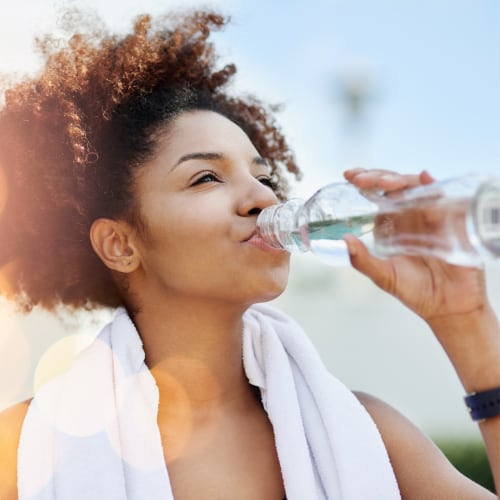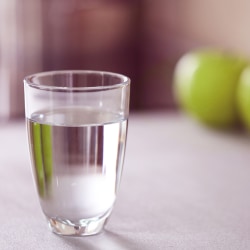 Hydration and Physical Performance
Hydration and Physical Performance
Hydration and Physical Performance

-
Main Ideas
Learning Objective
Understand the impact of hydration on physical performance and learn strategies to maintain optimal hydration levels during exercise.
Behavioral Objective
Implement hydration strategies, such as pre-exercise hydration and regular fluid intake during workouts, to enhance physical performance and recovery.
Key Thought
Proper hydration is the foundation for achieving peak physical performance, from endurance to strength and overall well-being.
-
Main Ideas
Learning Objective
Understand the impact of hydration on physical performance and learn strategies to maintain optimal hydration levels during exercise.
Behavioral Objective
Implement hydration strategies, such as pre-exercise hydration and regular fluid intake during workouts, to enhance physical performance and recovery.
Key Thought
Proper hydration is the foundation for achieving peak physical performance, from endurance to strength and overall well-being.
-
Terms
- Dehydration
noun
A condition resulting from insufficient water intake, leading to physical and mental impairments such as fatigue, mood changes, and reduced cognitive function.
- Electrolyte
noun
Minerals like sodium and potassium that regulate fluid balance, muscle contraction, and nerve function in the body.
- Sports Drinks
noun
Hydration beverages that contain water, electrolytes, and sometimes carbohydrates to support fluid balance and energy during intense physical activity.
-
Terms
- Dehydration
noun
A condition resulting from insufficient water intake, leading to physical and mental impairments such as fatigue, mood changes, and reduced cognitive function.
- Electrolyte
noun
Minerals like sodium and potassium that regulate fluid balance, muscle contraction, and nerve function in the body.
- Sports Drinks
noun
Hydration beverages that contain water, electrolytes, and sometimes carbohydrates to support fluid balance and energy during intense physical activity.
Introduction
Hydration is a key component of physical performance, often overlooked despite its critical role in endurance, strength, and overall athletic ability. Whether running a marathon or lifting weights, proper hydration can be the difference between excelling and falling short. This topic explores how hydration impacts performance, the role of electrolytes, and strategies for maintaining optimal hydration during exercise.
The Impact of Dehydration on Performance
Endurance, strength, and overall performance are closely tied to the body's hydration levels. Dehydration occurs when fluid loss exceeds intake, leading to electrolyte imbalances and impaired bodily functions. Here's how dehydration affects different aspects of physical performance:
Endurance
Running a marathon or engaging in prolonged exercise without sufficient hydration can lead to premature fatigue. Fluid loss through sweat reduces blood volume, forcing the heart to work harder to deliver oxygen and nutrients to muscles. Even mild dehydration significantly impairs aerobic performance, highlighting the importance of staying hydrated during extended activities.
Strength
Dehydration also affects muscle function, reducing strength and power output. Without adequate hydration, muscles are more prone to cramping and injury due to decreased elasticity. Athletes focusing on explosive movements or lifting weights should prioritize hydration to maintain muscle integrity and performance.
Overall Performance
Hydration is critical for various physiological processes, from regulating body temperature to facilitating nutrient transportation. Dehydration disrupts these processes, leading to reduced focus, increased perceived effort, and compromised coordination, all hindering athletic performance.
Tips and Strategies for Optimal Hydration
Effective hydration requires a proactive approach that begins well before exercise and continues afterward. Here are vital strategies:
Pre-Exercise Hydration
Start hydrating several hours before exercising by drinking 16 to 20 ounces of water. This ensures your body is adequately prepared for physical activity.
During Exercise Hydration
For activities lasting longer than an hour, sip water or a sports drink every 15-20 minutes to replenish lost fluids. Sports drinks containing electrolytes like sodium and potassium are particularly beneficial during intense workouts.
Post-Exercise Rehydration
Rehydration is essential after exercise to replace fluids and support recovery. A good rule of thumb is to drink 24 ounces of water for every pound of body weight lost during activity. Additionally, hydrating foods like fruits and vegetables can further aid rehydration.
The Role of Electrolytes and Sports Drinks
What are Electrolytes?
Electrolytes are minerals like sodium and potassium that maintain fluid balance, support muscle contraction and regulate nerve function. Vigorous exercise depletes electrolytes through sweat, making replenishment critical to prevent imbalances and muscle cramping.
The Purpose of Sports Drinks
Sports drinks combine water with electrolytes to help retain fluids, maintain nerve function, and prevent cramps during high-intensity or prolonged activities. However, it's important to monitor their sugar content. For shorter workouts, water is sufficient, while sports drinks should be reserved for intense or endurance-focused activities.
Precautions
Not all activities require sports drinks. For shorter or less intense workouts, the added calories may be unnecessary. Use sports drinks strategically for exercises lasting over an hour or significant sweat loss.
Conclusion
Hydration is vital to endurance, strength, and overall physical performance. Dehydration leads to fatigue, impaired muscle function, and reduced coordination, all hindering athletic potential. A comprehensive hydration strategy involves pre-exercise hydration, consistent fluid intake during exercise, and thorough rehydration afterward.
Understanding the role of electrolytes and using sports drinks judiciously can further support hydration during intense workouts. The next time you hit the gym or the running trail, remember that staying hydrated is as essential to your performance as your training routine. Each sip fuels your potential for greatness.
Hydration Awareness Test
Objective: Assess and understand the impact of hydration levels on physical performance and well-being.
Activity:
- At the start of your day, record how hydrated you feel (e.g., thirsty, neutral, or well-hydrated) and note any physical or mental signs of dehydration (e.g., fatigue, dry mouth, lack of focus).
- Before, during, and after exercise, note your energy levels, endurance, and any symptoms like cramps or headaches.
- For one week, adjust your water intake based on these observations (e.g., drink more water during workouts) and track how your performance and hydration awareness improve.
- At the end of the week, reflect on how staying hydrated affected your performance and overall feeling of well-being.
Electrolyte Experiment
Objective: Evaluate the role of electrolytes in your hydration strategy.
Activity:
- For one week, incorporate an electrolyte-rich sports drink during workouts lasting over an hour.
- Note any changes in energy levels, endurance, or muscle cramping compared to workouts using water alone.
Hydrating Foods Challenge
Objective: Enhance hydration through diet.
Activity:
- Add water-rich fruits and vegetables (e.g., watermelon, cucumber) to your meals for one week.
- Track any differences in hydration levels, workout recovery, or overall energy.
Course Outline
![]() Session Expired from Inactivity
Session Expired from Inactivity
Do you want to?
9618 Jefferson Highway, Suite D-191
Baton Rouge LA 70809-9636
(888) 424-0032 |
support@supplementrelief.com
* Disclaimer: This page is available exclusively for SupplementRelief.com clients. None of the information on this website is intended to replace your relationship with your healthcare provider(s). Nothing should be considered medical advice. The information, knowledge, and experience shared on this website are the opinions of SupplementRelief.com. This site and its content are intended to enhance your knowledge base as YOU MAKE YOUR OWN HEALTHCARE DECISIONS in partnership with your qualified health professional.
* These statements have not been evaluated by the Food and Drug Administration. These products and services are not intended to diagnose, treat, cure, or prevent disease.
* There is NO GUARANTEE OF SPECIFIC RESULTS for the products or services offered, and the RESULTS CAN VARY for each individual. Any results claimed by our customers are based on individual experiences that are unique and cannot be guaranteed.
FirstFitness Nutrition and NuMedica may be promoted and sold on the internet ONLY by Authorized Resellers who have been approved by and have registered their website domain with these companies. They strictly prohibit, and actively monitor, the UNAUTHORIZED SALE or RESALE of their products in ALL online public shopping portals including Amazon, eBay, and others and into other countries. All products purchased in SupplementRelief.com are for PERSONAL USE ONLY and CANNOT BE RESOLD to others. Please report violations of Reseller Policy directly to FirstFitness Nutrition at 800.621.4348 and to NuMedica at 800.869.8100.
The content and photographs on this website are copyrighted or Licensed Material and may not be downloaded for other than personal use. Republication, retransmission, reproduction, or any other use of the content or photographs is prohibited. ©2010-2024 SupplementRelief.com.
Are you sure you want to remove this item?








